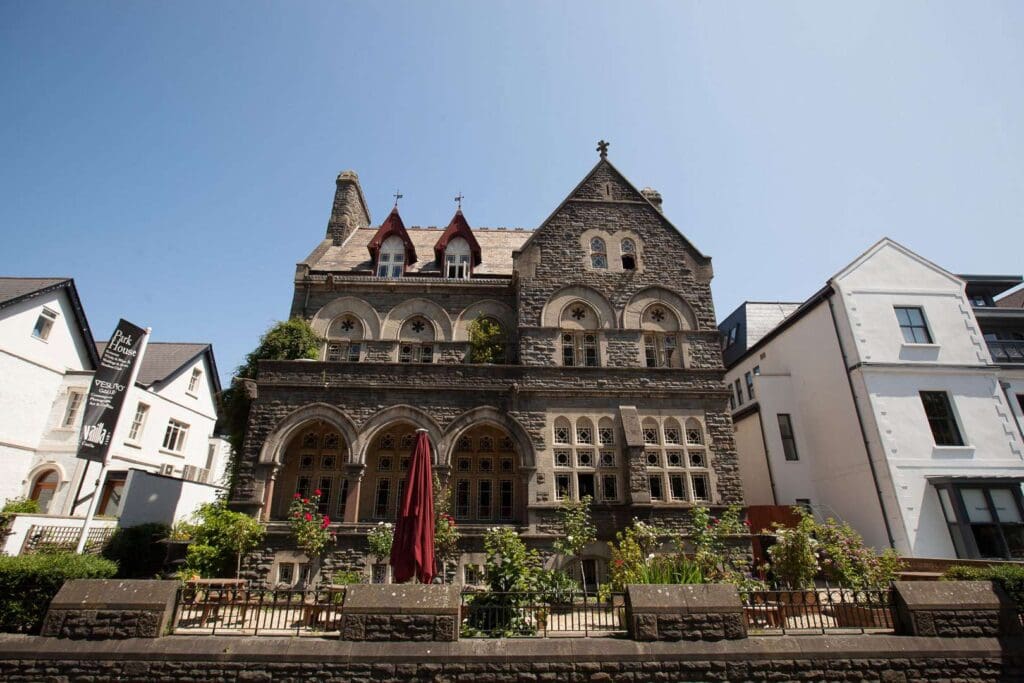One of Cardiff’s finest buildings could be brought back to life after lying empty over a year, if a financial loans package to cover refurbishment costs is agreed by Cardiff Council.
On Thursday, October 17, the council’s Cabinet will be asked to accept a recommendation to authorise an additional loan of £1,630,000 under the Welsh Government’s Town Centre Regeneration scheme to help deal with the increased cost of refurbishing Park House to meet heritage requirements, extending the original loan of £950,000.
Park House, a Grade 1 listed building designed by the renowned Victorian architect William Burges for Lord Bute, has stood empty for 18 months. Using the Welsh Government loans scheme, the council aims to help restore this architectural gem to its former glory.
Once completed Park House will be turned into a vibrant restaurant and events venue, blending modern amenities with its timeless architectural beauty.
The project is being led by highly respected, Welsh chef, Tom Simmons, who is known for his innovative approach to cooking. Simmons plans to create a high-quality dining experience that will attract residents and visitors, making Park House a premier destination for food and events.
Councillor Russell Goodway, Cabinet Member for Investment & Development, said: “The regeneration of Park House is a vital project for Cardiff. It not only preserves a significant piece of our architectural heritage but also revitalises the city centre, providing new opportunities for businesses and the community. We are committed to ensuring that Park House remains a landmark that Cardiff can be proud of, and we are looking at using a loan scheme made available to us by Welsh Government, which is aimed at town centre regeneration, so the building can be fully restored.”
To recoup the loan costs, the business will pay back over time and the money will be recycled into other similar schemes. This approach ensures that the financial support provided is used effectively and sustainably.
The expected economic impact of the Park House regeneration project is significant. According to a Savills’ Economic Impact study, the refurbished Park House is expected to generate 10,900 visitors per annum, contributing half a million pounds per year to the local economy.
The project will also bring substantial benefits to the local community. Tom Simmons is planning to work with local schools through the Cardiff Commitment initiative. The Cardiff Commitment is a programme that connects schools, businesses, and organizations to help young people in Cardiff gain valuable skills and experiences. By partnering with the Cardiff Commitment, Simmons will offer training courses in high-quality event management. This means students will have the chance to learn about planning and hosting events, which can open exciting career opportunities for them in the future. The initiative also aims to break down barriers related to social mobility, disabilities, and stereotypes, ensuring that all students have equal opportunities to succeed. The project will also create a new, vibrant space for social gatherings, events, and dining, providing a venue for local celebrations. The refurbishment will also enhance the appeal of the area, contributing to the overall improvement of the city centre. Additionally, the project will support local businesses by attracting more visitors to the area, boosting the local economy and creating job opportunities for residents.
Park House, designed by William Burges, is considered one of the most important 19th-century houses in Wales. Burges, a prominent Victorian architect, also designed other notable buildings in Cardiff, including Cardiff Castle and Castell Coch. His work is celebrated for its intricate Gothic Revival style, and Park House is a prime example of his architectural brilliance. The building’s historical significance and architectural grandeur make its restoration a priority before it deteriorates any further due to its recent closure. The building is located near the National Museum and City Hall, adding to its importance and prominence in the city.
The Transforming Towns Loan Scheme has been instrumental in supporting the regeneration of several other key buildings in Cardiff. A notable example includes Parador 44, a Spanish themed hotel above Asador, in the city centre.
The Council plans to secure the loans for the Park House project through a combination of measures including a fixed charge over the property and a debenture on the business. This means that the Council has a legal claim over the property and the business assets, which can be used to recover the loan amount if necessary.
Cardiff Council’s Cabinet will take the report at its next meeting from 2pm on Thursday, October 17.
Before that, the Economy and Culture Scrutiny Committee will review the report and its recommendations from 4.30pm on Tuesday, October 15.

